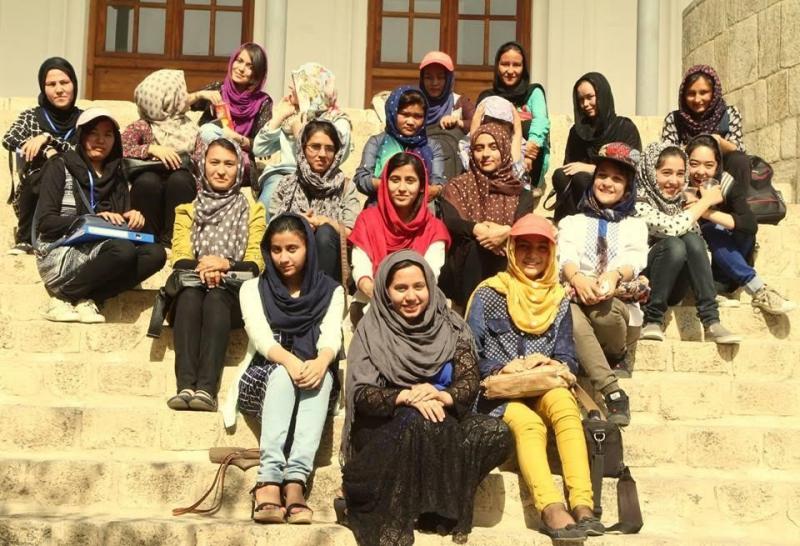Accumuler les expériences, travailler dur et rêver en grand – l’histoire de Meher Bano
Pendant son enfance passée dans une société caractérisée par une très forte misogynie, Meher Bano Mirzayee s’est heurtée à de nombreuses difficultés. Pour reprendre ses propres mots, dans cette société, « avoir un fils est une bénédiction et avoir une fille est une honte. C’est vraiment difficile d’être née dans une famille afghane pauvre et non éduquée. Ma chance a tourné quand nous avons émigré au Pakistan et que j’ai pu étudier ».
Le grand rêve de Meher Bano, c’est l’éducation.
« Dans ma vie, trois choses comptent : accumuler les expériences, travailler dur et rêver en grand »
Très tôt, alors qu’elle n’était encore qu’en 7e, Meher Bano Mirzayee a commencé à créer des bijoux au Pakistan. Elle était si créative dans l’élaboration de nouveaux modèles de bracelets, de colliers et de boucles d’oreille que le propriétaire du magasin qui l’employait a souhaité l’engager à plein temps alors même qu’elle allait encore à l’école. « Ça a été très difficile pour moi de travailler pour le compte d’une personne qui interférait de la sorte avec ma scolarité. Mais j’ai fini par réussir à gérer à la fois l’école et le travail. »
Plus tard, de retour en Afghanistan, Meher Bano a poursuivi ses études tout en se consacrant à un certain nombre d’activités bénévoles. Elle a notamment travaillé pour l’organisation Afghanistan’s New Generation, (la nouvelle génération de l’Afghanistan) donné des cours à des étudiant-e-s et participé aux activités des organisations Women for Afghan Women (femmes pour les femmes afghanes) et Everywoman Everywhere. Elle a effectué des stages en tant que traductrice de bulletins d’information pour 1TV Afghanistan et en tant qu’assistante de direction pour le Conseil pour l’Afghanistan de Son altesse le Prince Aga Khan Shia Imami Ismaili.
Pour Meher Bano, l’expérience et les rêves sont intimement liés au fait de travailler dur
« Le succès vient en travaillant dur. C’est la clé pour atteindre nos objectifs dans le futur. » Meher Bano doit sa réussite scolaire à son travail acharné et à sa volonté farouche de remettre en cause et de changer la façon dont la société afghane voit les filles et les femmes. « Je travaille dur pour faire quelque chose de nouveau dans ce monde. Je veux que mon peuple cesse de penser que les filles ne servent à rien. Je veux leur prouver qu’ils ont tort. »
Meher Bano considère l’éducation, les inégalités et la sécurité comme les défis majeurs que son pays doit relever. Et elle nous explique pourquoi :
« Le patriarcat est si profondément ancré dans la société afghane que celle-ci ne permet habituellement pas aux filles de suivre une scolarité. Dans mon pays, le problème sécuritaire fait que les familles n’autorisent pas les femmes à aller à l’école ou à travailler à l’extérieur. Les gens se sentent en insécurité et ils veulent protéger les femmes. Et ce type de protection génère des inégalités entre hommes et femmes, entre garçons et filles. Cela donne l’impression que les femmes sont faibles et que les hommes sont puissants et forts. Ils protègent les femmes de la mauvaise façon, ils les empêchent de jouir de leurs droits. » – Meher Bano Mirzayee

Pour contribuer au changement que Meher Bano’s envisage pour son pays, elle s’est fixé comme objectif de devenir un modèle pour les autres filles afghanes et un leader capable de mener les autres vers le succès. En partageant les connaissances et les idées avec d’autres personnes, il est possible de contribuer à faire naître le leadership et des leaders mais aussi de renforcer l’action collective. Il s’agit là de l’un des éléments que Meher Bano considère comme indispensables à la construction d’un mouvement.
En 2016, avec un groupe d’amies, elle a organisé un atelier intitulé « Afghan Girls’ Leadership », dont l’objectif était de permettre aux jeunes filles de Kaboul de devenir de véritables leaders. Quinze d’entre elles ont pris part à ce programme qui comprenait notamment des journées de service communautaire et des ateliers de créativité qui visaient, comme l’a expliqué l’une des participantes « à nous placer dans une situation où nous nous trouvions soudainement confrontées à un problème que nous étions censées résoudre avec ce que nous avions sous la main à cet instant précis. »
Le groupe a créé une page Facebook sur laquelle on peut par exemple lire :
« L’intérêt et la passion des jeunes leaders afghanes pour l’apprentissage est le moyen que nous proposons pour que l’Afghanistan devienne un pays paisible et bien gouverné. »
À l’heure actuelle, Meher Bano étudie à l’Université américaine d’Asie centrale au Kirghizistan grâce à l’obtention d’une bourse. Elle étudie l’administration des affaires ainsi que la psychologie en option. « Dans cette université, j’ai expérimenté le fait de me confronter à des personnes, des cultures et des langues différentes mais aussi à de nombreuses idées nouvelles. Je pense que l’expérimentation est le cœur de la vie. Je rêve d’accumuler de nouvelles expériences et d’apprendre davantage en voyageant dans d’autres pays. »
Meher Bano dit avoir choisi de devenir membre de l’AWID parce qu’elle a été séduite par sa vision.
« Je veux travailler en faveur des droits des filles et des femmes. Je veux me battre pour leurs droits et je veux qu’hommes et femmes soient égaux dans ce monde parce que nous sommes tous et toutes des êtres humains. » - Meher Bano Mirzayee
